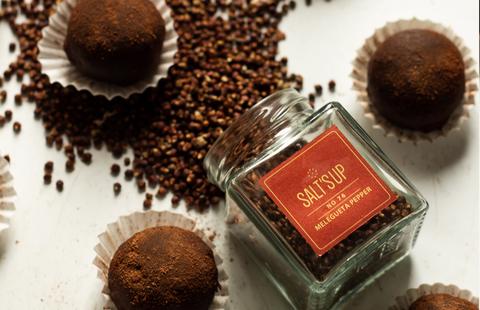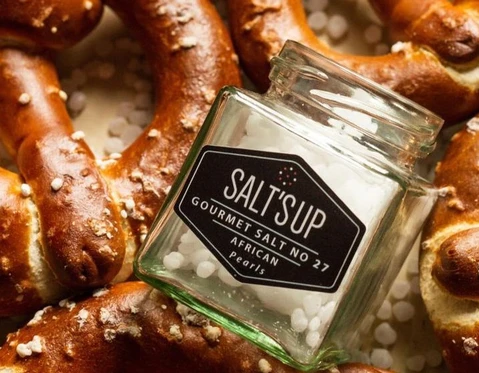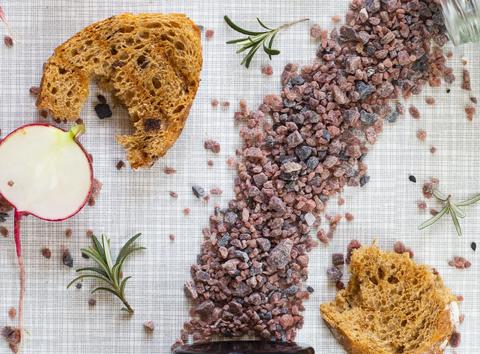Discover our handpicked collection of gourmet salts, spices & peppers
Shop Salt'sUp Collection →– Use your eyes to evaluate the color of the spice
– Use your nose and search for the aroma
– Use your tastebuds: essential oils are the key
So, how long can I keep ground spices?
What about my dried, whole friends?
– How to balance using a whole spice and not lose out on its aromaLet’s move onto preservation of herbs
– Ground herbs: grind size matters
– Fresh herbs are fresh until they not
Storage: Dried herbs and spices Final thoughts about how long herbs stay fresh

Spices go bad: True or sophisticated Myth?
There’s no doubt that no kitchen is complete without as many spices as you can possibly fit into your cupboards or your pantry.
Fresh, frozen, or dried, these little sprinklings of stardust bring so much flavor to the dishes we’re cooking at home that you’d be crazy to attempt to make stunning food without them. Granted, that sounds a little obvious, but how much attention are you really paying to what you’re putting in your recipes?
How long has that parsley been sitting in your refrigerator just waiting to be used? Or how long has that cayenne pepper you keep meaning to add to your chilis been caught at the back of the cupboard?
Like most people, the answer is probably too long. After all, some of us just don’t have the time to use everything up while it’s all still in date. As frustrating as it is at times, life just somehow manages to find a way to keep us busy.
What’s even more annoying is that there’s no real date on exactly when most spices go bad. Sure, it can be easier to spot when fresh basil loses its vibrant green color but what about dried oregano? Unless you’re some kind of freakishly eagle-eyed expert, it’s pretty much impossible to tell.
Well, almost impossible to tell. Luckily for you, there are some tips and tricks to keep in mind when it comes to judging just how fresh your herbs are.
The signs of dwindling spice
Use your eyes to evaluate color of spice
You won’t always be able to tell whether or not some of your ground spices are expiring just by looking at them but that doesn’t mean you shouldn’t at least try.
Paprika is always the easiest. That lovely deep rich color can fade into a far more pale imitation and you know that the end is nigh when that happens.
Once it loses its color, the fragments of fragrant fuel you’re looking for won’t be far behind.
Use your nose and search for the aroma
Ground spices within their sell-by dates will always smell fragrant or pungent, depending on whatever it is you plan to use. Indeed, if that chili powder doesn’t tickle your nostrils when you take a whiff, it’s probably coming towards the end of the time it deserves to sat taking up space in your cupboard
Use your tastebuds: essential oils are the key
Ok, so this is sounding a little like a science lesson now and nobody needs that.
However, if you’re not picking up any problems through the medium of sight and smell but you’re still unsure and something doesn’t feel right, have a taste.
For example, grab a pinch of those cumin seeds that have lingering around for a while and smash them in your hands. Sure, it feels a little barbaric, but what you’re looking for here are the essential oils.
If you can bring those out of your dried spices, you’re onto a winner.
Note: Fresh herbs and spices are obviously much easier to judge. Still, it’s important to point out the tips and tricks you can use to make sure you’re not ruining that lovely dish you’ve spent hours cooking.
- Check for mold
- Check if the color is a little less bright
- Make sure the leaves aren’t bitter by tearing a piece off
- Check it smells in date
- Make sure moisture isn’t building in the bottom of the packet

So, how long can I keep ground spices?
The key thing to remember when it comes to ground spices is that, generally, they lose their flavor faster than any other dried spice.
Still, that doesn’t mean you need to keep buying them. After all, they will largely last up for around 12 months, providing you’re not drastically changing the conditions in which they’re stored in.
Like everything in life, however, it’s not an exact science. For example, things like cardamom in its ground form will lose their aroma a few months faster than the general pack.
For products like that, you’re going to want to start to be vigilant after around six months.
What about my dried, whole friends?
The good news is, there’s even more time to use whole spices up.
If you’re like me and despise the idea of wastage, stocking up on whole spices is the best way to keep your kitchen armory well-stocked at all times. If an apocalypse comes, make sure you’re well prepared by having a large batch of these is basically what we’re saying.
Products like whole peppercorns, whole nutmeg, and cinnamon sticks can last up to THREE YEARS. Sure, it’s better to replace them every 18 months or so but, if for some reason you’ve gone 1,068 days between using nutmeg (what were you doing around Christmas time?) then you’re only really going to get a slightly less aromatic version as you would have when you first bought it home from the store.
Still, it’s important to remember that just because they can last up to that long, that doesn’t mean you can reuse the exact same spice over and over. For example, if you crush a cinnamon stick and attempt to put the shards you don’t use back in storage, you won’t get the same effect next time around.
Why? Because you’ll have broken the cellular wall and let the chemical compounds that give the spice its aroma drift out into the world. That’s gone. That’s hit the atmosphere and it’s never coming back.
How to balance using a whole spice and not lose out on its aroma
What I’d recommend here is arming yourself with some sort of tool from which you can control portion sizes.
For example, you can use a little hand grater (otherwise known as a MicroBlade) to shave off sprinklings of nutmeg or a pestle and mortar to extract the oils from your stick of cinnamon. From there, if you’ve got too much, you can then use that pulverized powder as the ground version instead.
There are also spice grinders available to buy online which makes your life so much easier on that front.

Let’s move onto preservation of herbs
Ground herbs: grind size matters
The rule of thumb when it comes to judging how long to keep dried herbs is that the coarser the herb – the longer they’ll last. So, things like ground parsley, thyme, rosemary, and certain types of oregano are likely to last up for around 18 months, the same as some of the ground spices we spoke about above.
Fresh herbs are fresh until they not
Sure, if you buy spices from a store, they’re likely to have a date on the package indicated as to when you should use them. However, if you’re buying these as fresh as can be from an independent seller or even if you’re lucky to have picked some yourself, that obviously isn’t always possible.
So, again, use your senses. If the color has dulled and the leaves are dropping, you’re probably coming towards the end of its lifespan. Also, check the bottom of your herbs. The more moisture dripping out of the herbs, the more of the aroma and freshness you’ll be losing for your dish.
They’re easier to gauge but don’t always think the signs are hugely obvious. Make sure to check in on these little guys.
Storage: Dried herbs and spices
Three words for you.
Cool. Dark. Dingy.
Ok, ‘dingy’ might be taking it a little too far but you need to store dried herbs and spices in a cool, dry, dark place. Indeed, most cupboards and pantries will do the trick but always be mindful that your hobs could be exuding heat and start to coax the freshness out of them.
If you’ve got containers with an air-tight lid, placing them in there is about as sensible a move as you could make.
Final thoughts about how long herbs stay fresh
The main things you need to remember are that you can use your senses and simple timelines to ensure you get the most of your dried spices and herbs.
Whole spices last up to three years. Dried herbs and spices last up to about 18 months. As long as they’re kept cool and dry, you won’t be having any problems.
Hopefully, this article helped you start to keep track of these. Spices can give you so much, you’ve got to treat them with respect.
Read also:
Salt’s Up: Our best salts and peppers for your kitchen(Opens in a new browser tab)
Best Salt and Pepper Mills 2022 for your kitchen(Opens in a new browser tab)
Ready to elevate your cooking?
Visit our salt shop in Tallinn or browse our online store
Visit saltsup.com →
